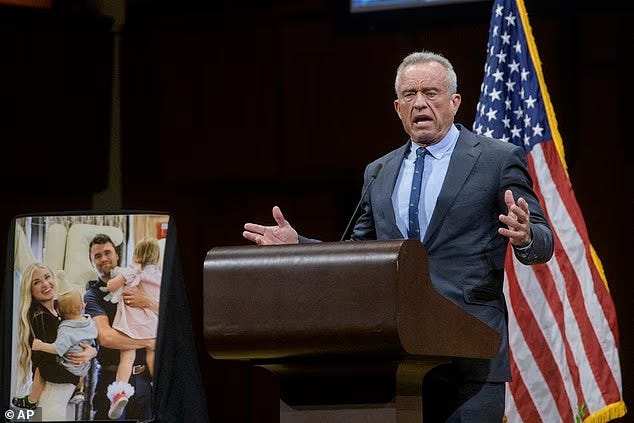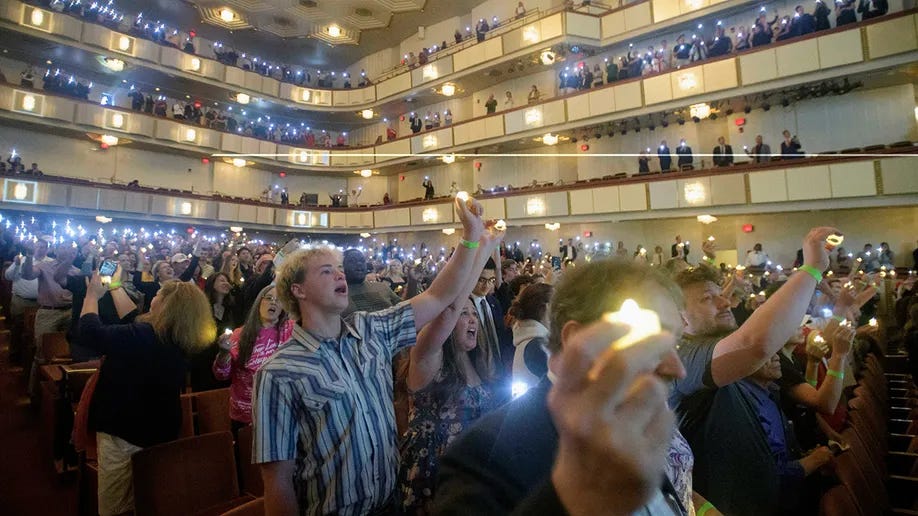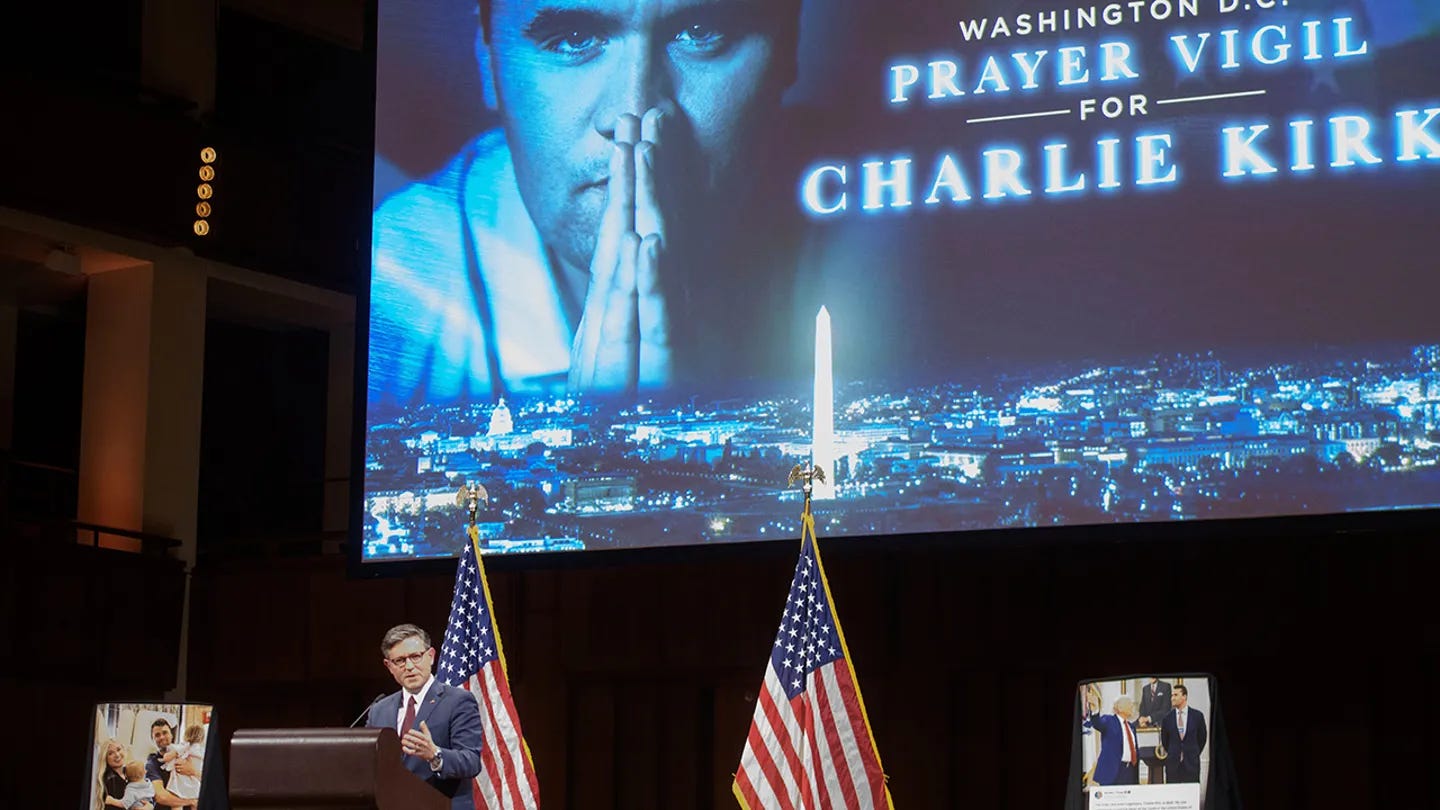Kennedy Delivers Passionate Eulogy for Charlie Kirk
By Louis Conte and Adam Garrie, The MAHA Report
On Sunday, September 14, hundreds of people, including President Trump, congressmen, and members of Trump’s cabinet, attended a somber tribute to Charlie Kirk at the Kennedy Center in Washington, D.C. When Secretary of Health and Human Services (HHS) Robert F. Kennedy Jr. took the stage, he received a standing ovation. He delivered a stirring, impassioned speech honoring Kirk, the conservative activist assassinated last week, as a unifier and a man of faith.
Photo by The Associated Press
Kennedy spoke about how he and Kirk had started their relationship cautiously but that the two men became “soul mates” and “spiritual brothers,” united by their passion for the U.S. Constitution and, most importantly, their dedication to freedom of speech, on which, Kennedy said, “all other rights depend upon.” He continued, “A government that can silence its opponents has license for any kind of atrocity.”
Photo by The Associated Press
Kennedy described Kirk, who founded the conservative non-profit,Turning Point, as an ally in the fight to restore not only freedom of speech, but also the right to assembly and worship – rights, he said, Kirk had vigorously fought for during the darkest pandemic days of government censorship and lockdowns. “Charlie,” Kennedy said, “more than any figure in our country, led the resistance that has restored freedom of speech to this country. He built this movement … to make sure that that never happens again.”
As a man who is personally devout and a civic constitutional absolutist, Kennedy developed a unique kinship with Kirk that he movingly described during his eulogy.
Kirk, Kennedy told the crowd, had been the architect and a driving force behind his decision to join forces with President Trump. In fact, Kennedy’s endorsement of Trump happened at a Turning Point rally in Scottsdale, Arizona.
“[Charlie] thought conversation was the only way we were going to heal our country,” Kennedy reflected. “We had to learn to talk to each other without vitriol, without poison… we had to be able to say what we mean – without being mean. And to talk to each other across this divide. That’s the only way to end the polarization that’s driven by these algorithms and by all these other forces in our society.”
Kennedy also reflected on a conversation he had with his mother, Ethel Kennedy. "When my brother David died, I had a conversation with my mother who had been through more than her share of loss and tragedy," Kennedy said. "And I said, I asked her ... does the hole they leave in you when they die, does it ever get smaller?”
Photo by The Associated Press
“And she said, ‘no, it never gets any smaller. But our job is to build ourselves bigger around the hole,’" he recalled.
Kennedy also reflected on a conversation he once had with Charlie. “He asked me whether I was afraid of dying and I answered, ‘there’s a lot worse things than dying.’ And chief among those is losing our constitutional rights and having our children raised in slavery. And I said to him, sometimes our only consolation is that we can die with our boots on, we can die fighting for these things.”
He closed with, “Charlie gave his life so that the rest of us would not have to suffer those fates worse than death. Now it’s our job – he’s no longer there to lead us – to rush in and fill the breach, and win this battle for our country, for God and for our families.”
Kennedy’s speech is reminiscent of his father’s speech in Indianapolis, on April 4, 1968, the day Martin Luther King Jr. was assassinated. His father told a stunned crowd that while many, especially black Americans, might be tempted to avenge King’s death, the path of peace and brotherhood is the only way to build a better, more just, and safer future for all Americans.
“For those of you who are black and are tempted to be filled with hatred and mistrust of the injustice of such an act, against all white people,” he said, “I can only say that I feel in my own heart the same kind of feeling….” He continued, “What we need in the United States is not division, what we need in the United States is not hatred, what we need in the United States is not violence and lawlessness — but is love, and wisdom, and passion toward one another.”
Like his father before him, RFK Jr. rose to an occasion in which our nation once again stands between an opportunity to redouble the fight for freedom or give in to the sinister forces that wish to snatch freedom away from all of us.
Throughout the bleakest days of social distancing, and the forced closure of churches, schools, and businesses, Kennedy and Kirk forged a friendship united by a devotion to the Constitution and to patriotism. Wherever and whenever Kennedy is asked to cite his favorite quotation, he has always, without hesitation, turned to the words of Founding Father, Patrick Henry – “Give me liberty or give me death.”
On Sunday night, Kennedy explained how deeply these words resonate for him while eulogizing his friend, Charlie Kirk.






RIP Charlie Kirk. God Bless his family and keep them safe. MAHA and MAGA unity ✝️🙏🏼
Thank you, RFK, for the moving tribute to Charlie Kirk. May your words resonate with everyone. We’ve lost an amazing man. We must remember that, “We are all Charlie Kirk,” now.